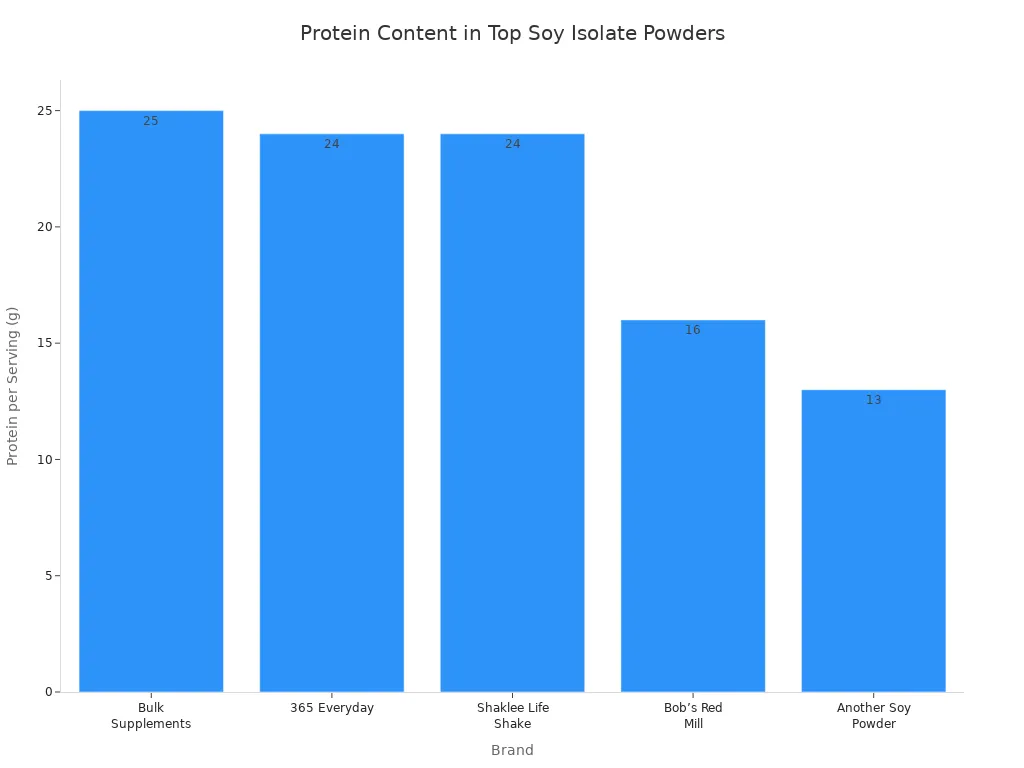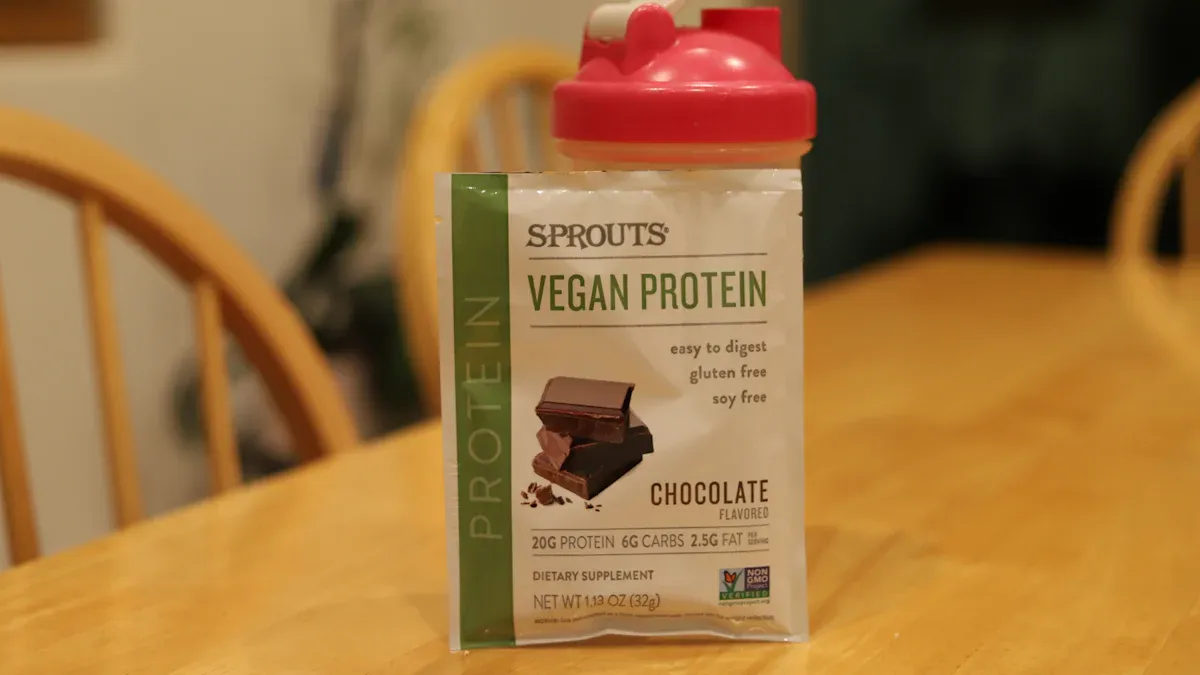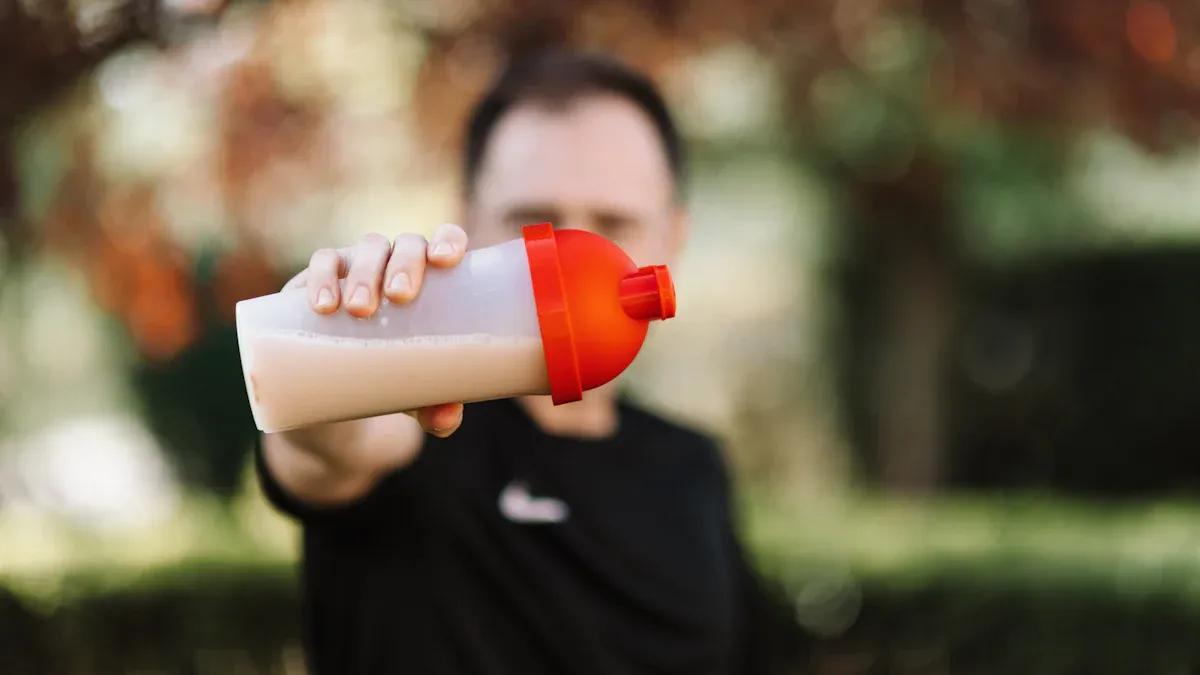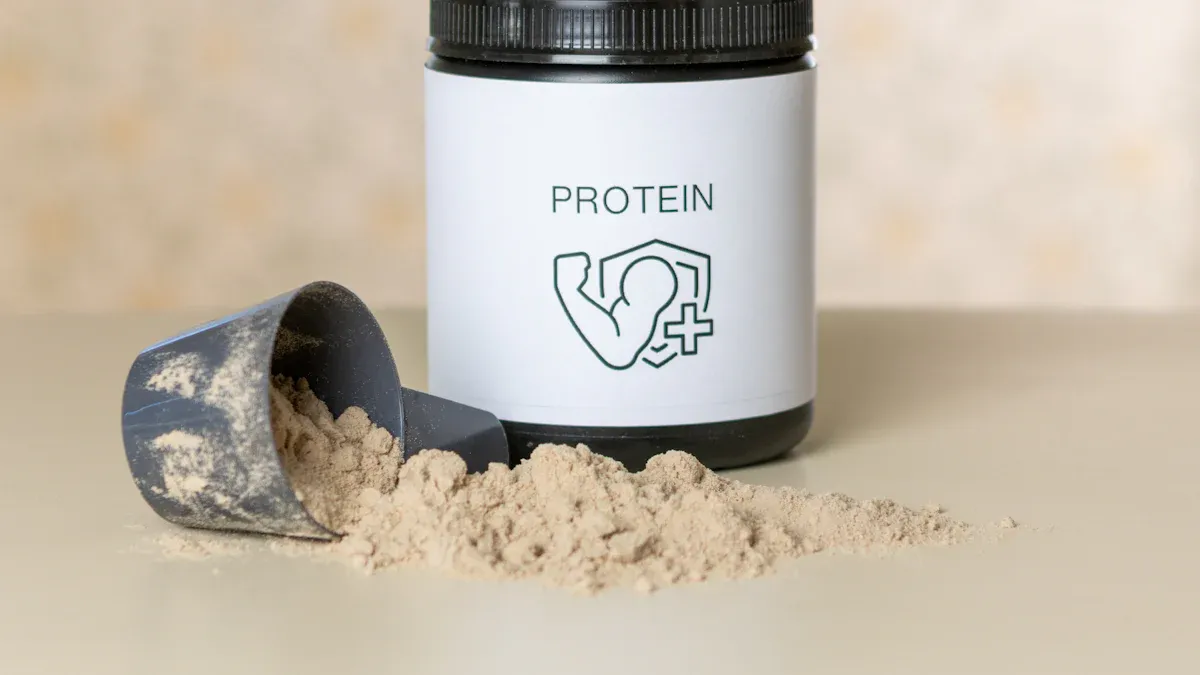Key Takeaways
-
Soy isolate protein powders offer a complete, plant-based protein with all essential amino acids, making them great for athletes, vegans, and anyone needing quality protein.
-
Top brands differ in taste, protein content, price, and certifications; Bulk Supplements provides the most protein per serving at a low cost, while Shaklee Chocolate offers the best flavor and mixability.
-
Soy protein supports muscle building and overall health, including heart and bone benefits, and is easy to digest for most people.
-
Most people tolerate soy protein well, but those with soy allergies or thyroid issues should consult a doctor before use.
-
When buying, look for high protein content, clean ingredients, and certifications that match your dietary needs to get the best value and quality.
Quick Comparison
Comparison Table
You want to see how the top soy isolate protein powders stack up. Here is a table that compares the leading brands on important factors:
|
Brand |
Taste |
Nutrition (Protein/Serving) |
Value |
Certifications |
Mixability |
|---|---|---|---|---|---|
|
Bob’s Red Mill |
Mild, slightly bitter |
16g |
Good |
Gluten-free, Kosher, Keto, Dairy-free |
Decent |
|
Bulk Supplements |
Plain, neutral |
Excellent |
Third-party tested, Gluten-free, Lactose-free |
Some issues |
|
|
365 Everyday |
Smooth, neutral |
24g |
Affordable |
Non-GMO, Vegan |
Good |
|
Shaklee Chocolate |
Rich chocolate |
24g |
Premium |
Non-GMO, Kosher, Vegan |
Very good |
You can also compare the protein content per serving in this table:
|
Brand |
Protein Content per Serving |
|---|---|
|
Bulk Supplements Soy Protein Isolate |
25 grams |
|
365 Everyday Soy Protein |
24 grams |
|
Shaklee Life Shake Chocolate |
24 grams |
|
Bob’s Red Mill Soy Protein Powder |
16 grams |

Key Features
Each brand offers unique benefits. You should choose based on your needs and preferences.
-
Bob’s Red Mill stands out for its simple ingredients and balanced nutrition. You get a gluten-free, keto-friendly, and dairy-free option. The taste is mild but can be a bit bitter. This powder works well if you want a clean label and good value.
-
Bulk Supplements gives you the highest protein per serving. You pay less for more protein, making it a top pick for budget shoppers. Some users notice blending and taste issues, but you get strong nutrition and third-party testing.
-
365 Everyday provides a smooth, neutral taste and solid nutrition. You get 24 grams of protein per serving. This brand is affordable and works well for daily shakes.
-
Shaklee Chocolate offers a rich chocolate flavor and high protein. You pay a premium, but you get a product with strong certifications and excellent mixability. This powder is great if you want taste and nutrition together.
You can use these quick facts to help you find the best soy isolate protein powder for your goals.
Top Brands Reviewed

Bob’s Red Mill
You may know Bob’s Red Mill for its simple and clean ingredients. This brand gives you a soy isolate protein powder that fits many diets. You get 16 grams of protein in each serving. The powder is gluten-free, dairy-free, and keto-friendly. You can use it in smoothies, baking, or even oatmeal.
Highlights:
-
Simple ingredient list
-
Gluten-free and dairy-free
-
Keto-friendly
Pros:
-
Mild taste blends well with fruit or cocoa
-
Good value for the price
-
Trusted brand with strong certifications
Cons:
-
Lower protein per serving compared to other brands
-
Slightly bitter taste if you drink it plain
Certifications:
-
Gluten-free
-
Kosher
-
Keto
-
Dairy-free
Best Use Cases: You can use Bob’s Red Mill if you want a clean label and need a powder for recipes. Dietitians often recommend this brand for people with food allergies or those who want a simple protein source.
Tip: Mix Bob’s Red Mill with banana or berries to improve the taste.
Bulk Supplements
Bulk Supplements gives you a high-protein option at a low price. You get 25 grams of protein in each serving. The powder comes unflavored, so you can add it to any recipe. You pay about $0.75 per serving, which saves you money if you use protein powder every day.
Here is a table showing the main pros and cons:
|
Pros |
Cons |
|---|---|
|
Affordable price (~$0.75 per serving) |
Unflavored/plain taste may not appeal to all |
|
High protein content (25g per serving) |
No scoop included, making measurement less precise |
|
Complete plant protein with all essential amino acids |
Some reports of clumping and poor solubility |
|
Low calorie and fat content |
Packaging can be messy when opened |
|
No additives or artificial sweeteners |
Not suitable for soy allergies |
|
Well tolerated by sensitive stomachs |
Not ideal for bulking phases needing higher calories |
|
Versatile due to unflavored nature, blends well with strong flavors |
Taste and solubility issues noted by some users |
|
Third-party tested and available in bulk sizes |
|
|
Effective for muscle building and recovery when blended |
|
Certifications:
-
Third-party tested
-
Gluten-free
-
Lactose-free
Best Use Cases: You should choose Bulk Supplements if you want the most protein for your money. Athletes and bodybuilders often use this brand for muscle building and recovery. You can blend it with strong flavors like chocolate or peanut butter to mask the plain taste.
Note: If you have a sensitive stomach, Bulk Supplements may work well for you.
365 Everyday
365 Everyday gives you a smooth and neutral-tasting soy isolate protein powder. You get about 24 grams of protein in each scoop. The powder is vegan-friendly and non-GMO. You can buy it in vanilla flavor, which makes it easy to mix with fruit or milk alternatives.
Here is a table with key nutritional information and certifications:
|
Attribute |
Details |
|---|---|
|
Protein per serving |
Approximately 23-24 g per 27.7 g scoop |
|
Serving size |
About 27.7 g (1 scoop) |
|
Calories |
Low fat and carbs |
|
Certifications |
Non-GMO, Kosher, Vegan-friendly |
|
Ingredients |
No artificial ingredients or sweeteners |
|
Allergen info |
Facility processes tree nuts, milk, and eggs |
|
Price per serving |
Around $2.62 |
|
Flavors |
Vanilla |
Highlights:
-
Smooth texture
-
Vegan and non-GMO
-
No artificial sweeteners
Pros:
-
Good protein content
-
Easy to blend and drink
-
Works well for daily shakes
Cons:
-
Higher price per serving than Bulk Supplements
-
Only available in vanilla flavor
-
May not suit people with severe allergies due to facility cross-contamination
Best Use Cases: You can use 365 Everyday if you want a vegan protein powder for breakfast or post-workout shakes. Dietitians suggest this brand for people who want a clean formula and easy mixability.
Tip: Try blending 365 Everyday with frozen mango for a creamy smoothie.
Shaklee Chocolate
Shaklee Chocolate gives you a rich chocolate flavor with 24 grams of protein per serving. The powder is non-GMO, kosher, and vegan. You get excellent mixability, so you can stir it into water or plant milk without lumps.
Highlights:
-
Rich chocolate taste
-
High protein content
-
Premium certifications
Pros:
-
Tastes great on its own
-
Mixes smoothly
-
Strong nutrition profile
Cons:
-
Higher price than other brands
-
Only available in chocolate flavor
-
Premium cost may not fit all budgets
Certifications:
-
Non-GMO
-
Kosher
-
Vegan
Best Use Cases: You should choose Shaklee Chocolate if you want a tasty protein shake and care about strong certifications. Many athletes and busy professionals use this powder for quick nutrition and flavor.
Note: If you want a dessert-like shake, Shaklee Chocolate is a top choice.
Soy Isolate Protein Powder Benefits

Muscle Building
You want to build muscle and recover faster after workouts. Soy isolate protein powder can help you reach these goals. Scientific studies show that this plant-based protein supports muscle growth and strength gains. When you use soy isolate protein powder in the right amount, you can see results similar to those from whey protein. For example, research finds that people who take soy protein and do resistance training gain as much muscle as those who use animal-based proteins. Some studies even show that soy protein helps reduce muscle damage after exercise, which means you can recover faster.
Tip: Try drinking soy isolate protein powder before or after your workout to support muscle building and speed up recovery.
You get all nine essential amino acids from soy protein. This makes it a complete protein, just like animal sources. Many athletes and active people choose soy isolate protein powder because it is easy to digest and works well for building lean muscle.
Health and Nutrition
Soy isolate protein powder does more than help your muscles. It also supports your overall health. You can enjoy many benefits when you add it to your diet:
-
Lowers LDL cholesterol and improves your cholesterol profile
-
Contains isoflavones that may help bone health and reduce menopausal symptoms
-
May lower the risk of certain cancers and support heart health
-
Helps control blood sugar and supports kidney function in people with diabetes
-
Provides fiber for a healthy gut
-
Rich in vitamins and minerals like B vitamins, iron, calcium, and antioxidants
You get a high-quality protein source that fits vegan and vegetarian diets. Soy isolate protein powder gives you nutrients that support your immune system and help your body absorb other nutrients better. Many people use it to maintain a healthy weight and support strong bones.
Side Effects and Safety
Common Concerns
You may wonder if soy isolate protein powder is safe for daily use. Most people tolerate it well, but you should know about a few possible side effects. Some people feel bloated or have mild stomach upset when they first try this protein. You might also notice gas or changes in digestion. These effects often go away as your body gets used to the new protein source.
If you have a sensitive stomach, start with a small serving and see how your body reacts.
Some people worry about soy and hormones. Soy contains isoflavones, which are plant compounds that act like weak estrogen in the body. Studies show that normal use of soy isolate protein powder does not cause hormone problems in most people. You can safely use it as part of a balanced diet.
Here is a quick list of common concerns:
-
Mild digestive issues (bloating, gas)
-
Rare allergic reactions
-
Concerns about hormones (not a problem for most people)
-
Possible interaction with thyroid medication
Who Should Avoid
You should avoid soy isolate protein powder if you have a soy allergy. Even a small amount can cause a serious reaction. People with thyroid problems should talk to a doctor before using soy protein. Soy can sometimes affect how your body absorbs thyroid medicine.
If you have kidney disease, ask your doctor before adding extra protein to your diet. Children and pregnant women can usually use soy protein, but it is best to check with a healthcare provider first.
|
Who Should Avoid Soy Isolate Protein Powder |
Reason |
|---|---|
|
People with soy allergies |
Risk of allergic reaction |
|
Those with thyroid conditions |
Possible medication interaction |
|
People with kidney disease |
Need to limit protein intake |
Always read the label and check with your doctor if you have health concerns.
Soy Isolate Protein Powder vs. Whey
Nutrition Comparison
You might wonder how soy isolate protein powder compares to whey protein powder when it comes to nutrition. Both options give you all nine essential amino acids, so they are complete proteins. However, they have some differences in their nutrient profiles and unique compounds.
|
Nutrient/Characteristic |
Soy Protein Isolate |
Whey Protein Isolate |
|---|---|---|
|
Protein per ounce |
>20 grams |
|
|
Calcium (% Daily Value) |
14% |
10% |
|
Iron (% Daily Value) |
14% |
Present (amount varies) |
|
Amino Acid Profile |
Higher in arginine, phenylalanine, tryptophan |
Higher in leucine, isoleucine, methionine, lysine |
|
Vitamins and Minerals |
B complex, vitamin E, zinc, iron, phosphorus, potassium |
Calcium, iron, potassium, phosphorus, magnesium |
|
Unique Compounds |
Phytoestrogens, fiber, enzymes, protease inhibitors, lectins, phytic acid |
Beta-lactoglobulin, alpha-lactalbumin, trace butterfat, lactose |
|
Source |
Processed from soybeans |
Derived from cow’s milk |
Soy protein contains plant compounds called phytoestrogens, which may have health effects. Whey protein has special milk proteins and a small amount of lactose. If you want more iron and fiber, soy protein is a good choice. If you need more leucine for muscle building, whey protein may work better.
Tip: If you have a dairy allergy or follow a vegan diet, soy isolate protein powder gives you a plant-based, complete protein.
Performance
You may ask which protein helps you build muscle and lose fat more effectively. Studies show that both soy and whey protein support muscle growth. However, whey protein often leads to greater muscle gains and fat loss in athletes.
|
Performance Outcome |
Whey Protein Powder |
Soy Isolate Protein Powder |
|---|---|---|
|
Muscle Growth |
Greater muscle protein synthesis; more lean mass gain |
Supports muscle growth but less effective than whey |
|
Body Fat Reduction |
More fat loss, especially belly fat |
No significant fat loss compared to whey |
|
Hormonal Effects |
May increase testosterone and lower cortisol |
Does not increase testosterone or estrogen |
You can still see good results with soy isolate protein powder, especially if you train hard and eat enough protein. Some athletes find no big difference in body composition when using soy instead of whey. Your results may depend on your training, diet, and personal needs.
Note: Whey protein may give you a slight edge for muscle and fat loss, but soy isolate protein powder remains a strong plant-based option.
Buying Guide
What to Look For
When you choose a soy isolate protein powder, you want to focus on a few key factors. This helps you get the best product for your needs.
-
Check if you have any allergies or sensitivities. Soy is a common allergen, so always read the label.
-
Look for a clean ingredient list. Fewer additives, sweeteners, and thickeners mean a purer product.
-
Pick a powder with a high protein content. Soy isolate usually has over 90% protein by weight, which is good for muscle growth and easy digestion.
-
Review the processing method. Isolates are filtered to remove extra fat and carbs, making them better for people who want to limit these nutrients.
-
Consider the protein quality score. Soy isolate scores high, though slightly lower than whey, but still supports muscle building.
-
If you have digestive issues, isolates are often easier on your stomach than concentrates.
Tip: If you are new to protein powders, start with a small amount to see how your body reacts.
Price and Value
You want to get the most for your money. Compare the price per serving, not just the total cost. Some brands offer higher protein content, which can make them a better value even if the price is higher. Watch for bulk options if you use protein powder often. Remember, a higher price does not always mean better quality. Check the ingredient list and certifications to make sure you get good value.
Certifications
Certifications help you know the product meets safety and quality standards. Here is a table showing common certifications and what they mean:
|
Certification Name |
Purpose/Significance |
|---|---|
|
Informed Sport |
Tested for banned substances |
|
Keto-Friendly |
Suitable for ketogenic diets |
|
Kosher (Triangle K) |
Meets kosher dietary laws |
|
No Aspartame, No Sucralose, No Ace-K |
Free from artificial sweeteners |
|
Non-GMO Project Verified |
Free from genetically modified organisms |
|
Steroid Tested |
No steroids present |
|
Vegan |
Suitable for vegan consumers |
|
Safe Quality Food (SQF) |
High standards for food safety and quality |
Many soy isolate protein powder brands also address dietary needs. You can find options for vegan and vegetarian diets, lactose intolerance, and gluten-free needs. Always check for allergen warnings, especially if you have a soy allergy.
Note: Certifications and dietary labels help you choose a product that fits your health goals and restrictions.
You have many choices when picking a soy isolate protein powder. Shaklee Chocolate stands out for flavor, Bulk Supplements offers the best value, and 365 Everyday works well for daily use. Always check protein content, ingredient quality, and certifications. Match your choice to your health goals, such as muscle building or weight loss. Nutritionists suggest using protein powders to fill gaps, not replace whole foods. Try a sample, join a community, or ask a nutritionist for advice before making your final pick.
FAQ
Can you use soy isolate protein powder if you have a dairy allergy?
You can use soy isolate protein powder if you have a dairy allergy. Soy does not contain dairy. Always check the label for cross-contamination warnings.
How do you mix soy isolate protein powder for best results?
Add one scoop to water, milk, or a smoothie. Use a shaker bottle or blender. Mix until smooth. You can add fruit or cocoa for better taste.
Does soy isolate protein powder help with weight loss?
Soy isolate protein powder can help you feel full. You may eat less and lose weight. Use it as part of a balanced diet and regular exercise.
Is soy isolate protein powder safe for kids and teens?
Soy isolate protein powder is usually safe for kids and teens. You should ask a doctor before starting. Check for allergies and use age-appropriate servings.


1 Comment
Top Protein Sources Compared: Whey, Soy, Pea, and Rice Protein
[…] Soy protein is a complete protein for vegans. It gives you important amino acids, iron, and calcium. Watch out for allergies with soy protein. […]